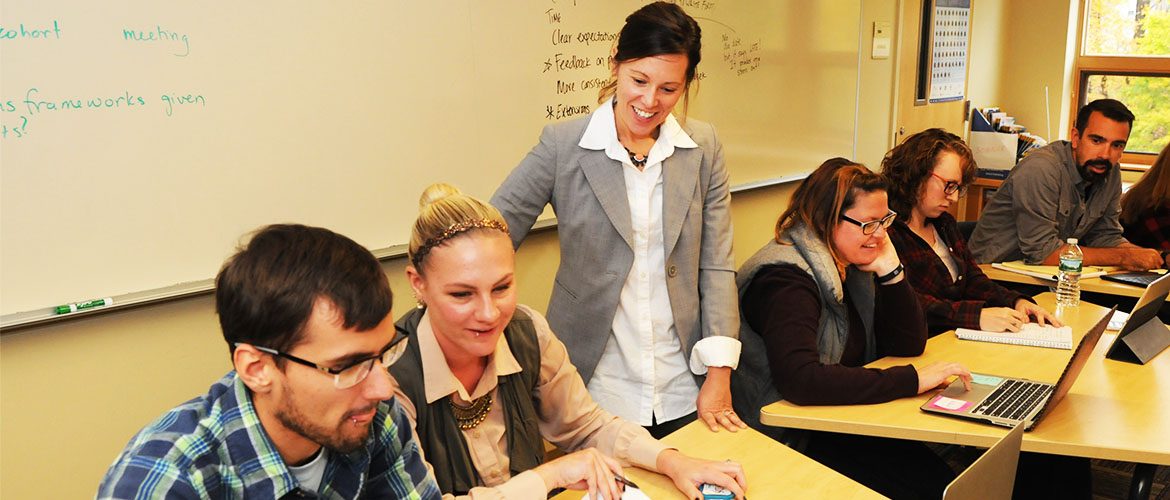Maine requires 24 credits of coursework for Special Education 282 Certification, including 3 credits in specially designed instruction, 3 credits in evaluation and assessment, and 3 credits in reading instruction. Participants in the Alternate Route to Certification pathway may take eight courses or only selected courses, depending on how many credits they need to reach the required 24 credits. To assist you in meeting your professional goals, our SPARC program is designed to be high quality and flexible to your needs and time.
SPARC Course Selection Guidelines For Students Seeking 282 Certification
The SPARC program is designed to be high quality and flexible to assist you in meeting your professional goals. The following information provides you with guidance in selecting the courses you need if you are seeking your 282 certification in Maine.
If you are planning to complete all of your 24 credits through the SPARC pathway, we suggest that you start by completing the following four courses because they are essential building blocks in the field of special education. The initial course you select will depend on the semester that you enter the program.
- SED 506 Assessment in Special Education
- SED 511 Mathematics Instruction for Students with Disabilities
- SED 514 Literacy Development for All Students
- SED 507 Curriculum and Instructional Programming for Students with Disabilities
At some point in your program (preferably after completing at least one of the above courses), we recommend that you take SED 508 Classroom and Behavior Management of Students with Disabilities and SED 518 Special Education Law.
Your remaining credits will vary based on your professional goals.
Enrollment
UMF’s Special Ed Alternate Route to Certification (SPARC) courses are open to all practicing Special Education educators holding a baccalaureate degree, including in-service educators, those working in Birth to Age 5 intervention settings, Ed Techs, and others.
The UMF SPARC pathway includes thirteen online graduate courses, which are offered on a rotating schedule. For this program, there is no need to apply for admission to UMF. Participants must have access to students with special needs in order to complete assignments for courses.
See the SPARC Course Selection Guidelines near the bottom of this page for guidance in selecting the courses you need if you are seeking your 282 certification in Maine.
The UMF professors know the state’s requirements very well and focus on student needs and practical, classroom-based issues that matter most to becoming a successful Special Education teacher.
All of my professors had a wealth of Special Education teaching experience and they treated us like adult professionals, which I deeply appreciated. The SPARC program was the best bet, hands down, for becoming credentialed in the least amount of time.
— Susan Hedrich
Who began the SPARC program while working
as an Ed-Tech in Special Education at
Maine’s Windham High School
Special Education Courses
- SED 503 Preparing Students for the Future: Transition Programming, Self-determination and Advocacy
- SED 504 Collaborative Partnerships Among Individuals with Disabilities, Families, and Professionals
- SED 505 Universal Design
- SED 506 Assessment in Special Education
- SED 507 Curriculum and Instructional Programming for Students with Disabilities
- SED 508 Classroom and Behavior Management of Students with Disabilities
- SED 511 Mathematics Instruction for Students with Disabilities
- SED 513 Early Childhood Speech and Language: Development, Disorders, and Interventions
- SED 514 Literacy Development for All Students
- SED 515 Early Intervention: Working with Infants and Toddlers with Disabilities and Their Families
- SED 517 Professional Ethics, Cultural Competence, and Evidence-based Practices in Early Intervention and Early Childhood Special Education
- SED 518 Special Education Law
- SED 519 Assistive Technology
- SED 529 Individualized Positive Behavior Support
Note: SPARC courses may be taken to fulfill master’s degree concentration requirements, re-certification, professional development and personal goals.
Click here for courses offered during the next available term.
To see course descriptions please review the Graduate Catalog.
Contact Us
Division of Graduate & Continuing Education
University of Maine at Farmington
Theo Kalikow Education Center
186 High Street
Farmington, Maine 04938
tel 207-778-7502
fax 207-778-8134
TYY (via Maine Relay Service) dial 711
gradstudies@maine.edu
Mailing address:
Division of Graduate & Continuing Education
University of Maine at Farmington
111 South Street
Farmington, Maine 04938


